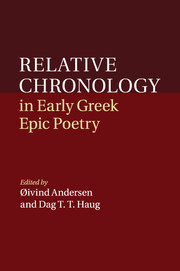Book contents
- Frontmatter
- Contents
- Notes on contributors
- Preface
- Abbreviations
- Introduction
- Chapter 1 πρῶτόν τε καὶ ὕστατον αἰὲν ἀείδειν
- Chapter 2 Relative chronology and an ‘Aeolic phase’ of epic
- Chapter 3 The other view
- Chapter 4 Late features in the speeches of the Iliad
- Chapter 5 Tmesis in the epic tradition
- Chapter 6 The Doloneia revisited
- Chapter 7 Odyssean stratigraphy
- Chapter 8 Older heroes and earlier poems
- Chapter 9 The Catalogue of Women within the Greek epic tradition
- Chapter 10 Intertextuality without text in early Greek epic
- Chapter 11 Perspectives on neoanalysis from the archaic hymns to Demeter
- Chapter 12 The relative chronology of the Homeric Catalogue of Ships and of the lists of heroes and cities within the Catalogue
- Chapter 13 Towards a chronology of early Greek epic
- Bibliography
- General index
- Index locorum
Chapter 8 - Older heroes and earlier poems
The case of Heracles in the Odyssey
Published online by Cambridge University Press: 05 January 2012
- Frontmatter
- Contents
- Notes on contributors
- Preface
- Abbreviations
- Introduction
- Chapter 1 πρῶτόν τε καὶ ὕστατον αἰὲν ἀείδειν
- Chapter 2 Relative chronology and an ‘Aeolic phase’ of epic
- Chapter 3 The other view
- Chapter 4 Late features in the speeches of the Iliad
- Chapter 5 Tmesis in the epic tradition
- Chapter 6 The Doloneia revisited
- Chapter 7 Odyssean stratigraphy
- Chapter 8 Older heroes and earlier poems
- Chapter 9 The Catalogue of Women within the Greek epic tradition
- Chapter 10 Intertextuality without text in early Greek epic
- Chapter 11 Perspectives on neoanalysis from the archaic hymns to Demeter
- Chapter 12 The relative chronology of the Homeric Catalogue of Ships and of the lists of heroes and cities within the Catalogue
- Chapter 13 Towards a chronology of early Greek epic
- Bibliography
- General index
- Index locorum
Summary
In the Iliad, Heracles’ ἄεθλοι for Eurystheus are taken for granted (Il. 8.362–5, 15.639–40, 19.96–133). That ‘even Herakles, dearest of all to Zeus, succumbed to fate and the wearisome anger of Hera’ (18.119) is a comfort to Achilles. Heracles is said once to have wounded Hera, though (5.392–4), and Hades as well (5.394–400), and also to have attacked Pylos (11.689–90). Heracles’ dealings with Laomedon and his sack of Troy are proudly reported by his son by Astyocheia, Tlepolemus (5.638–51), who is leader of the contingent from Rhodes (2.653–70). Along with the barely mentioned Phidippus and Antiphus, sons of the Heraclid Thessalus (2.678–9), Tlepolemus may have been introduced into the action at Troy by the poet who has him die at the hands of Sarpedon (Il. 5.657–7). Heracles as a father figure and a formidable hero looms large in the horizon. Whether Homer for his Heracles references in the Iliad relied on a specific Heracles epic or drew on a composite tradition of epic song and mythological narrative, of which there must also have been a great deal, we cannot know. Also, we cannot know how much in the way of invention and adaptation that went into the fashioning of the hero at relevant points in the Iliad. While Heracles – Hera's hero of the labours – will have been a figure about whom everybody knew the essentials, he will at the same time have lent himself to being associated with ever more adventures and to being exploited for a variety of purposes.
That will hold true also in the case of the Odyssey. There, the older hero comes into the picture on three occasions: first, in Scheria, as Odysseus identifies himself as the next best archer in the world, while adding that he would not contend with earlier men like Heracles and Eurytus (8.215–29); second, at the end of the Nekuia, when Odysseus reports his encounter with the terrifying εἴδωλον of Heracles (11.601–27); finally, in Ithaca, as Penelope goes to fetch Odysseus’ bow and we get to learn about its provenance in a story which features Eurytus and Iphitus as well as Heracles (21.13–41). My interest in these passages, relevant to the question of relative chronology, is threefold. First, concerning matter: what do the passages in Books 8, 11 and 21 refer to and rely on in terms of contents? how should they be contextualized and filled out? Second, concerning method: how can we know what is old and what new? For example, does opaqueness of circumstances or details imply the existence of, and even the audience's familiarity with, a clearer and more complete version? Third, concerning function: to what extent and in what way do the three episodes contribute to the Homeric (and the Homerist) audience's appreciation of what is going on in the Odyssey? We shall mainly consider the incidents told in books 8 and 21, which involve Eurytus as well as Heracles.
- Type
- Chapter
- Information
- Relative Chronology in Early Greek Epic Poetry , pp. 138 - 151Publisher: Cambridge University PressPrint publication year: 2011
- 3
- Cited by



